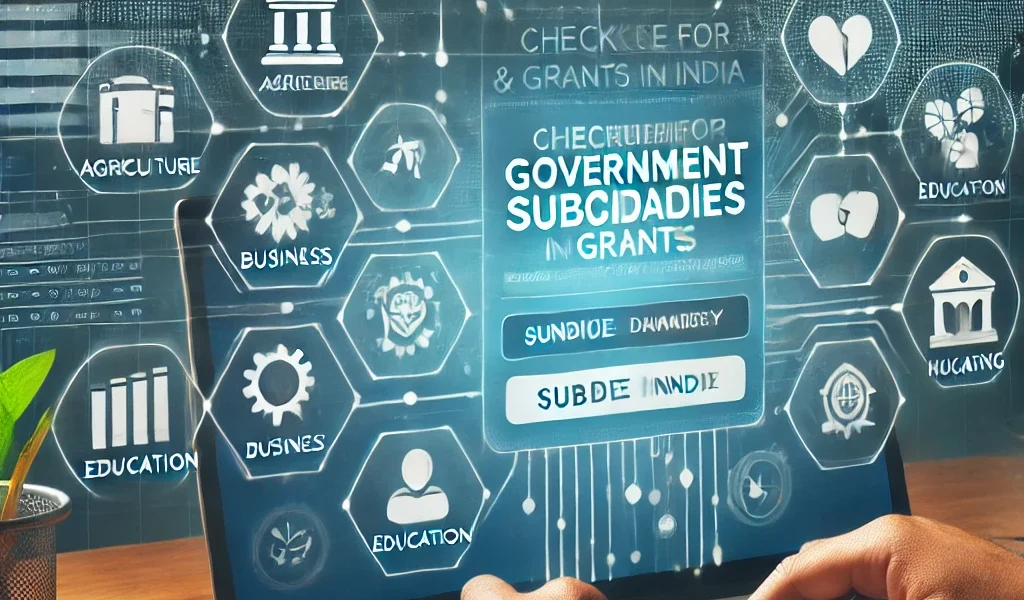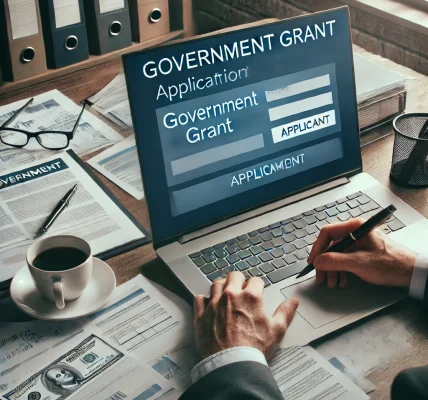Government subsidies and grants are crucial financial aids that help individuals, businesses, and various sectors grow. The Indian government provides numerous schemes covering agriculture, small businesses, education, healthcare, housing, and more. However, understanding eligibility criteria and the application process is essential to avail these benefits. In this comprehensive guide, we will walk you through the process of checking eligibility for government subsidies and grants in India while ensuring legal compliance and authenticity.
Understanding Government Subsidies & Grants
What Are Government Subsidies?
Subsidies are financial assistance provided by the government to individuals, businesses, or industries to lower the cost of products or services and encourage growth in specific sectors.
What Are Government Grants?
Grants are non-repayable financial aid provided by the government to support various initiatives such as research, education, business development, or welfare programs.
Types of Government Subsidies & Grants Available in India
- Agricultural Subsidies – For farmers to buy fertilizers, equipment, and seeds at a reduced cost.
- Startup and MSME Grants – Financial aid for new businesses and small-scale industries.
- Education Grants & Scholarships – Financial assistance for students, particularly from economically weaker sections.
- Housing Subsidies – Support for purchasing affordable housing (e.g., PMAY – Pradhan Mantri Awas Yojana).
- Healthcare Grants – Financial assistance for medical treatment and health insurance coverage.
- Renewable Energy Subsidies – Encouragement for solar and wind energy installations.
- Export Promotion Subsidies – Support for businesses engaged in exports.
- Women Empowerment Grants – Financial assistance for female entrepreneurs and self-help groups.
Step-by-Step Guide to Check Eligibility for Government Subsidies & Grants
Step 1: Identify the Relevant Scheme
The Indian government runs multiple schemes, each with different eligibility criteria. To find the right subsidy or grant for you:
- Visit official government websites such as:
- National Portal of India
- MyScheme Portal
- Ministry-specific portals (e.g., MSME, Agriculture, Education, etc.)
- Search for subsidies and grants that match your sector, profession, or need.
Step 2: Read the Eligibility Criteria Carefully
Each scheme has specific eligibility conditions based on:
- Age, Gender, and Income Group
- Business Category (Startup, MSME, Corporation, NGO, etc.)
- Geographical Location (Rural/Urban/Specific States)
- Purpose of Subsidy (Education, Housing, Business Expansion, etc.)
- Documents Required (Aadhaar, PAN, Bank Details, etc.)
Step 3: Verify Your Eligibility Using Online Tools
Some government portals offer online eligibility checkers:
- MyScheme Portal (myscheme.gov.in) – Provides a tool to check which schemes you qualify for.
- NSP (National Scholarship Portal) – Helps students check scholarship eligibility.
- Udyam Registration – For MSMEs to check eligibility for business-related grants.
- PMAY Eligibility Calculator – To check eligibility for housing subsidies.
Step 4: Gather the Required Documents
Before applying, ensure you have all the necessary documents, which may include:
- Identity Proof (Aadhaar Card, PAN Card, Voter ID, etc.)
- Income Proof (ITR, Salary Slip, BPL Card, etc.)
- Business Registration Certificate (for MSMEs and startups)
- Educational Certificates (for scholarships and education grants)
- Bank Account Details (for direct fund transfers)
- Land Ownership Proof (for agricultural subsidies)
Step 5: Apply Through the Official Portal
Once eligibility is confirmed, proceed with the application:
- Online Application:
- Most subsidies and grants can be applied for through government websites.
- Fill out the application form accurately.
- Upload the required documents.
- Submit and note the application reference number.
- Offline Application:
- Some schemes require submission at government offices (e.g., Gram Panchayat, Municipal Office, etc.).
- Visit the designated office and submit your form along with the documents.
Step 6: Track Your Application Status
After submission, track the application status on the portal where you applied. Most portals provide:
- Application ID for tracking
- Email/SMS updates
- Customer support helplines for inquiries
Step 7: Receive the Subsidy or Grant
If your application is approved, you will receive the benefits:
- Direct Benefit Transfer (DBT): Amount is credited directly to your bank account.
- Vouchers or Discounts: Some subsidies provide discounts instead of cash transfers.
- Tax Benefits: Certain subsidies allow tax exemptions or deductions.
Common Mistakes to Avoid While Applying
- Using Unverified Sources: Always apply through official government portals to avoid scams.
- Providing Incorrect Information: Incorrect details may lead to rejection or legal consequences.
- Missing Deadlines: Most schemes have limited timeframes, so apply on time.
- Not Keeping Track of Application: Regularly check the status to avoid missing any additional requirements.
- Failing to Keep a Copy of Application & Receipts: Always save copies for future reference.
Legal Considerations to Keep in Mind
- Fraudulent Claims: Providing false information or submitting fake documents can result in penalties or legal action.
- Data Privacy: Ensure your personal and financial details are shared only on government-verified portals.
- Tax Implications: Some grants may be taxable; consult a tax professional if needed.
- Compliance with Terms & Conditions: Always read the fine print before accepting any subsidy or grant.
Final Thoughts
Checking your eligibility for government subsidies and grants in India requires thorough research and verification. By following the steps outlined above and ensuring compliance with legal guidelines, you can successfully avail the financial aid you deserve. Always rely on government sources, stay updated on new schemes, and apply diligently to maximize your benefits.
For the latest updates on government subsidies and grants, bookmark the official portals and subscribe to government notifications. If you have any doubts, consult a legal or financial expert to ensure safe and successful application.




